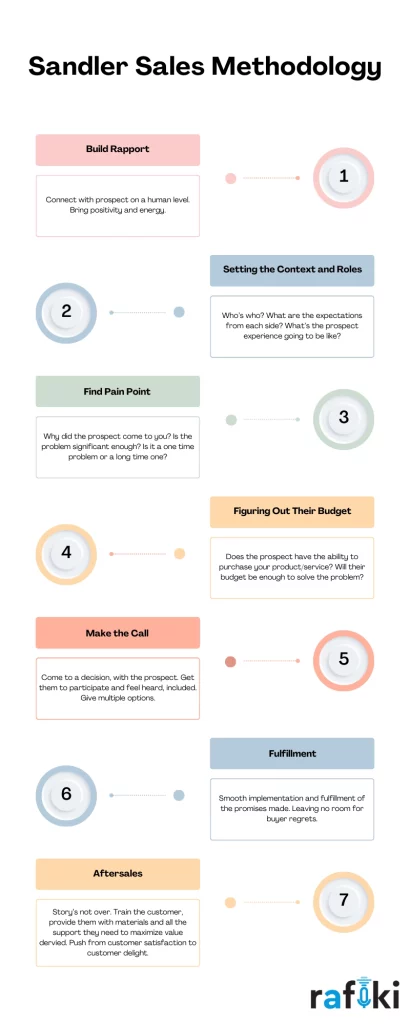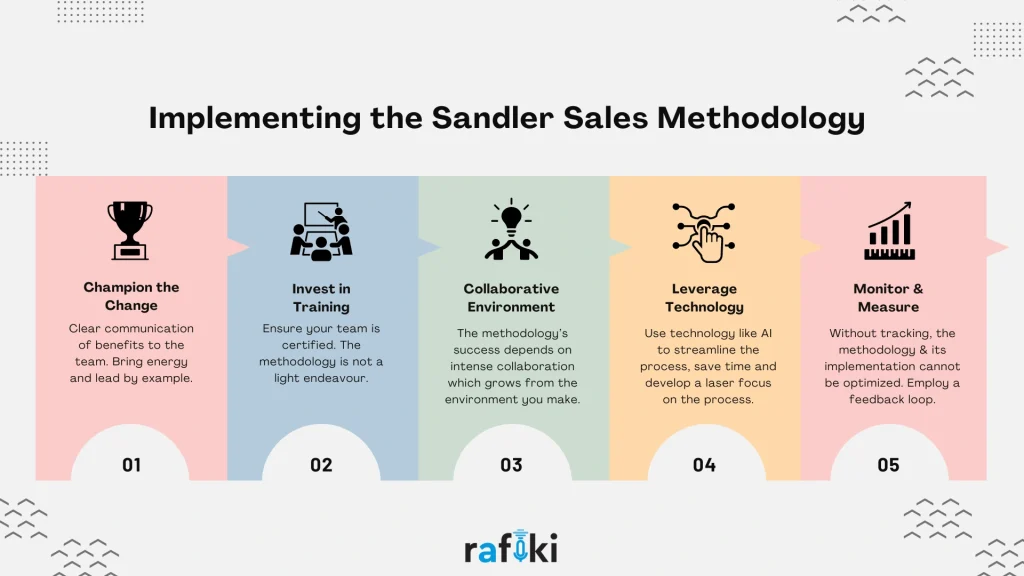Why Rafiki
Pricing


Pricing
Solutions

RevOps Leaders
Synchronize revenue generating functions

SDR Leaders
Get your team aligned and Coach your Reps 3x faster at scale

Sales Leaders
Unlock pipeline truth, drive confident forecasts

Every sales leader wants to improve their team performance. The competition is real and waits for no one. While there's no one-size-fits-all solution, the Sandler Sales Methodology has emerged as a powerful framework for equipping sales teams with the tools and mindset needed to consistently close deals and build lasting customer relationships.
This proven approach shifts the focus away from traditional "pushy" sales tactics and instead emphasizes building trust, uncovering customer needs, and presenting solutions that genuinely address them. The result? A more effective, efficient, and ultimately, more rewarding sales experience for both your team and your customers.
The Sandler Sales Methodology isn't just a buzzword; it's a structured approach built on seven core principles designed to guide your sales team towards success. Let's unpack these pillars and see how they contribute to building lasting customer relationships and closing deals:

This pillar emphasizes connecting with your customer on a human level. It's not just about the product; it's about establishing a positive connection that fosters open communication. This can involve finding common ground, actively listening, and building trust through genuine conversation.
Before diving into the sales pitch, it's crucial to set the context of the conversation and establish roles and responsibilities. This involves clarifying the purpose of the meeting, outlining who each person is, and defining expectations for the interaction. By setting the stage and ensuring everyone feels comfortable, you can create a collaborative and productive environment.
Before proposing solutions, the Sandler approach focuses on uncovering the specific challenges and frustrations faced by your customer. By asking insightful questions and actively listening, you can understand their "pain points" and identify the areas where your product or service can provide value. Check out this article of ours to learn more about how to ask insightful questions.
Understanding your customer's budgetary constraints is crucial for tailoring your solution and ensuring successful implementation. This pillar encourages you to engage in open and honest conversations about budget to determine if your offering aligns with their financial capabilities.
This pillar moves beyond forcing a decision. It focuses on collaboratively arriving at a decision where both the salesperson and the prospect acknowledge that the product or service is the right fit to address the identified problem. By presenting value propositions, addressing concerns, and building trust, you can create a win-win situation where both parties benefit.
Closing the deal is just one step on the journey. This pillar emphasizes the importance of ensuring a smooth implementation and fulfilling the promises made. This involves clearly defining the next steps, providing ongoing support, and ensuring the customer is satisfied throughout the process.
The Sandler methodology goes beyond short-term transactions. It encourages you to build long-term partnerships with your customers by fostering consistent support and follow-up after the sale. This can involve providing training, addressing any concerns, and demonstrating your commitment to their success. By exceeding expectations during this stage, you can cultivate loyal advocates and secure long-term growth.
By mastering these seven pillars, sales professionals can transform their approach, build stronger relationships with customers, and achieve consistent and sustainable sales success.
Rafiki's Smart Call Summary feature, powered by advanced GPT technology, automatically generates summaries of your customer interactions, capturing key information and eliminating the need for manual note-taking. This allows reps to focus on the prospect and not on the notes.
Equipping your team with the Sandler Sales Methodology is an investment that reaps significant long-term rewards. However, successfully implementing this new approach requires strategic planning and dedicated effort. Here are some key steps to guide you in the process:

As a sales leader, your enthusiasm and commitment to the Sandler sales methodology are crucial for its successful adoption. Clearly communicate the benefits to your team, highlight the potential impact on their performance and career growth, and demonstrate your own commitment by actively participating in training and development initiatives.
The Sandler methodology is not a quick fix. Provide comprehensive training for your sales team, led by certified Sandler trainers. This training equips your team with the knowledge, skills, and tools needed to effectively implement the seven pillars in their daily interactions.
The Sandler approach thrives on collaboration and open communication. Encourage your team to share best practices, offer constructive feedback, and support each other's growth. Consider implementing peer coaching programs or holding regular team meetings to facilitate knowledge sharing and reinforce the core principles.
Technology can be a powerful tool to streamline the implementation of the Sandler methodology and enhance individual and team performance. Rafiki's Ask Rafiki Anything feature, allows you to ask specific questions regarding rep performance, deals, or accounts. This streamlines your ability to identify areas for improvement and tailor coaching and training efforts to address individual needs, ensuring your team maximizes the potential of the Sandler methodology.
It's critical to track your team's progress and measure the impact of implementing the Sandler methodology. Identify relevant Key Performance Indicators (KPIs), such as win rates, sales cycle length, and customer satisfaction. Regularly analyze data, assess progress, and identify areas for improvement. By continuously monitoring and refining your approach, you can ensure your team is on track to achieve sustainable sales success.
Implementing a new sales methodology requires investment and commitment, and naturally, you'll want to gauge its effectiveness in driving desired results. So, how can you measure the impact of the Sandler Sales Methodology on your team's performance?
The first step is to determine the metrics that matter most to your organization. Here are some KPIs to consider:
Utilize your CRM system and conversation intelligence platform like Rafiki to gather and analyze data related to your chosen KPIs.
Regularly analyze the collected data to identify trends and measure the impact of the Sandler methodology on your chosen KPIs. Look for improvements in win rates, reductions in sales cycle length, and increases in average deal size and customer satisfaction. If certain metrics are not improving as expected, dig deeper to understand the underlying causes. Based on your analysis, you can then make targeted adjustments to your training programs, coaching strategies, or even the specific KPIs you track.
The Sandler Sales Methodology offers a proven path to transform your sales team from order takers to trusted advisors who consistently exceed customer expectations and drive sustainable sales growth.
Implement & Track Sandler Sales Methodology
By embracing a culture of learning and adaptation, you can ensure your sales team remains perfectly positioned to thrive in the ever-evolving business landscape. Utilize the insights from Rafiki to continuously monitor progress, identify areas for improvement, and refine your approach. Explore how Rafiki can help your team reap the benefits of Sandler Sales Methodology by signing up for a free 14 day trial!